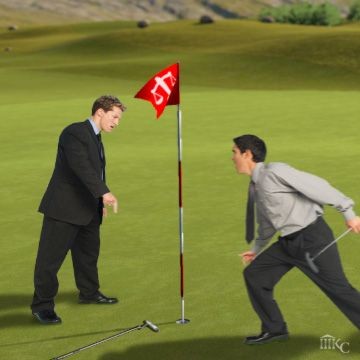The Lawyer's Lawyer
Friendly Conflicts
Q. I've been approached to represent the husband in a messy custody case. His wife is using an old law school classmate and fellow golfer who serves with me on a bar association committee. Would that present a conflict?
A. Maybe. Maybe not. It really depends on the nature of your relationship and whether it may interfere with your duties as opposing counsel.
Under the Rules of Professional Conduct, a conflict would arise if the relationship between opposing counsel may present "a significant risk that the representation of one or more clients will be materially limited." If the relationship presents a significant risk that your client's confidence will be revealed or that your loyalty and independent judgment may be compromised, you may only take the case if you "reasonably believe" that the quality of your representation won't suffer. Even then, you must fully disclose the conflict to your potential client, get his "informed consent" to waive the conflict, and confirm it all in writing.
According to the American Bar Association's Standing Committee on Ethics and Professional Responsibility, "not all personal relationships with opposing counsel create a conflict that would require client informed consent or even disclosure." At one end of the spectrum, opposing counsel who are related by blood or marriage, or are romantically involved, maintain a level of intimacy that may be too strong to waive. Conversely, where one's opposing counsel is a mere "acquaintance" with infrequent, superficial interaction, the collegiality presents little risk and no need for disclosure.
"Friendships," as varied as they are, require an up close and personal examination. In general, the closer and more personal the friendship, the greater the likelihood of a conflict.
Every relationship is different, presenting varying levels of trust, confidence and affinity. To determine whether a friendship must be disclosed or would even require a client's informed consent to your representation, consider the:
➤ Nature of Contact – do you socialize with this friend? Exchange gifts at holidays, share family vacations, or visit each other's homes?
➤ Frequency of Contact – is this a "friend" you see a couple of times a year, or a couple of times a week? How often do you talk on the phone?
➤ Intimacy of Communication – as friends, do you "confide" in each other, sharing details of your lives that you would not share with other lawyers?
➤ Adversarial Process – would your friendship reduce the tenacity that you would otherwise bring to the battle? If necessary, would you move to sanction your friend for discovery violations? Or, would you back off in light of your relationship?
In many cases, your collegiality may actually facilitate an amicable resolution and keep costly battles to a minimum. But if you are inclined to take the case, you must "reasonably believe" that your friendship will not impede the strength and diligence of your advocacy in an adversarial process that may not go as smoothly as one might hope.
In your case, the mere fact that you both graduated from the same law school class would not, in and of itself, pose any sort of conflict. Nor would your participation on the same bar committee or an incidental round of golf among a foursome of lawyers. In isolation, none of these interactions would present a conflict or trigger a duty to disclose to a potential client.
But what if you play golf with this lawyer every week, using your time on the links to catch up on your lives and to share personal details? What if you and your golfing buddy co-chair that bar association committee and communicate regularly on its affairs? When you get together, do you "talk shop" and exchange ideas on interesting legal issues and case strategy?
The more interaction you have, the more you should disclose the relationship and let the client decide. Even if you don't think it will affect your performance as counsel, my friendly advice is to err on the side of disclosure. After all, if your client learns about it later on, his response may not be all that friendly.
